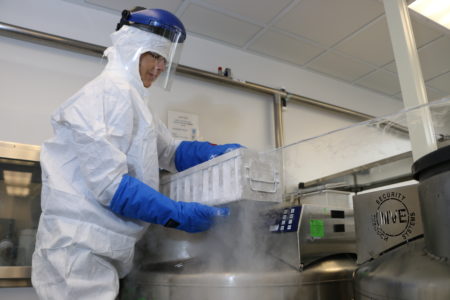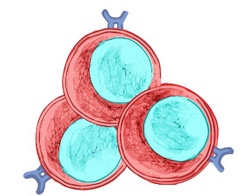“Off-the-shelf” donor T cells primed to fight five specific viruses were shown to be effective in a Phase 2 trial backed by Viracyte. A single infusion produced a complete or partial response rate of 92%.
Adoptively transferred virus-specific T cells were generated from eligible third party donors and then primed to recognize five common viral pathogens: EBV, adenovirus, CMV, BK virus, and HHV-6. The cells were administered to 38 patients with 45 infections in a Phase II clinical trial. Clinical benefit was achieved in 31 patients treated for one infection and in seven patients treated for multiple infections.
Not only were infusions safe, no cases of de novo acute (Stage 2-4) GVHD were observed. On the basis of epitope specificity, the investigators tracked the third-party cells and determined that they persisted for up to 12 weeks.
Baylor developed off-the-shelf donor T cells because it is not always possible to develop stem-cell donor-derived primed T-cells quickly in an acute situation.

Dr. Ifigeneia Tzannou working on a batch of virus specific T-cells at the Center for Cell and Gene Therapy at Baylor College of Medicine. Photo courtesy of Baylor College of Medicine.
Although it was not included in the published study, the first author Ifigeneia Tzannou described additional data relating to HHV-6 at the 10th International Conference on HHV-6 & 7 held in July 2017. Of the ten evaluable patients who were treated with either donor-derived or third party virus specific cells, all ten responded to the treatment, including two patients with encephalitis. Furthermore, the HHV-6 specific T-cells were tracked and the investigators confirmed that the cells passed the blood brain barrier.
Viracyte is a Houston company with an exclusive license agreement with Baylor College of Medicine to develop T-cell immunotherapies that target viruses. The company was formed in 2013 by Drs. Ann Leen, Juan Vera, Helen Heslop, Malcolm Brenner, and Cliona Rooney (all from the Center for Cell and Gene Therapy at Baylor College of Medicine) as well as Mr. John Wilson, CEO of Wilson Wolf Manufacturing. In addition to the multi-virus T-cells, the company is testing a product for CMV alone, and just won NIH grants to develop T-cell immunotherapies to challenge conventional treatment options for adenovirus and BK virus.
Read the full paper: Tzannou 2017.

